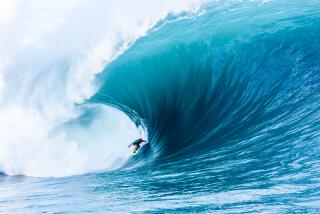Setting Sail in Search of Gold : Ventura’s Thorpe Charting Course for the Barcelona Olympics
- Share via
Underneath a J-24 sailboat in dry dock, Jeff Thorpe runs a power sander across the keel, planing the leading edge to razor sharpness. It’s grunt work, but it pays the bills and enables him to be a serious sailor without having to run off and join the Navy.
“A new J-24 costs $42,000 rigged, a lot of money,” he said during a break from work at Anchors Way Marine boatyard in Ventura. “So I buy old boats and fix them up and sell them. That’s how I can pay for my sailing.”
Thorpe, 25, isn’t confining his sailing to Ventura Harbor. Chasing the dream of Olympic gold, Thorpe is crewing for former USC sailing Coach Doug McLean in the soling class, which consists of 27-foot boats guided by three-man crews. McLean’s team is ranked third in the country by the U.S. Yacht Racing Union, but only one U.S. soling team will qualify for the 1992 Olympics in Barcelona.
And as every sailor since Columbus has learned, money and luck are as important as talent and skill. At the recent pre-Olympic Trials off the coast of Florida, Thorpe and his teammates won the first two races and were in contention in the third until they collided with another craft on a port tack, tearing the bow off their boat and knocking them out of the competition. So the soling is in dry dock instead of in Barcelona for this summer’s Olympic tuneup.
“Like the Lakers winning, you have to be on and have a lot of luck,” Thorpe said.
The money factor also can sink an Olympic campaign. When McLean asked Thorpe to join forces with him in 1989, they felt they had to raise $300,000 to stay alive for three years. Olympic sailing is expensive: A new soling costs $32,000, a set of sails is $3,000 and has to be replaced before every regatta. And international travel is mandatory.
Thorpe’s team has raised less than $200,000, mostly through private donations. Hertz let them use a van last year in Europe, where they competed in three events, finishing 12th in both the Scandinavian championships and the 1990 pre-Olympic Trials. The USYRU has given them about $20,000, but Thorpe figures they still need “another $65,000 to make it to the trials next year.”
“We have to get corporate sponsorship or this campaign could fall apart,” said McLean, 26.
When it comes to finances, the team is at a disadvantage because a lot of its Olympic competitors are not in the same financial boat. “We race against guys with a lot of family money or heavy sponsorship,” Thorpe said.
So Thorpe still lives at home with his parents to save money. His company, One Design West, restores boats and preps them for races, but it also gives him the freedom to hopscotch the globe for five months out of the year. He’s in business with Brendan Higgins, a former schoolmate at Ventura High.
Growing up in Ventura, Thorpe was a precocious sailor, racing sabots in the Ventura Yacht Club junior program at the age of 6. Since the age of 10, he has been a regular crewman in local races.
“Jeff’s been racing almost every weekend of his life,” said Ernie Thorpe, Jeff’s father.
Ernie, an executive at an aerospace engineering firm and commissioner of the Ventura Port District, moved with his wife Joan and their three children to Ventura from the East Coast in 1974. The whole family became involved in sailing, recreational and competitive. Joan is one of the top women sailors in Ventura and Ernie also has won his share of medals.
But as Jeff developed his sailing skills, his relationship with his father became strained. “Jeff crewed for me up until he was about 15,” Ernie said. “By then, it was getting difficult for us to sail together. I wasn’t willing to recognize that he was better and more experienced than I was. That’s hard to do with your son.”
Father and son didn’t sail together for a few years but Jeff eventually broke the ice by asking Ernie to crew for him in local J-24 races. Now, they’re co-owners of Colorblind, a J-24 that was Ventura County boat of the year in 1990.
“Maybe he grew up and I grew up,” Ernie said.
Jeff also grew out . His size, fluctuating between 215 and 220 pounds, is a big reason why McLean chose him to crew the soling. “I needed guys over 200,” McLean said. “Jeff also grew up racing dinghies--having that knack is important.”
Thorpe and McLean make a good combination: Thorpe keeps the boat in racing trim and McLean raises money.
“I would have not made it this far without him,” McLean said. “His knowledge working with boats is invaluable.”
Thorpe has to repair the soling in time for the North American Championships in July on Lake Michigan. A month later, they’ll compete in the world championships on Lake Erie. Still to be determined is their third crew member.
“We want to win the worlds, or at least be in the top 10,” Thorpe said. “Then we’ll be in a good position to make the Olympics.”
More to Read
Go beyond the scoreboard
Get the latest on L.A.'s teams in the daily Sports Report newsletter.
You may occasionally receive promotional content from the Los Angeles Times.






